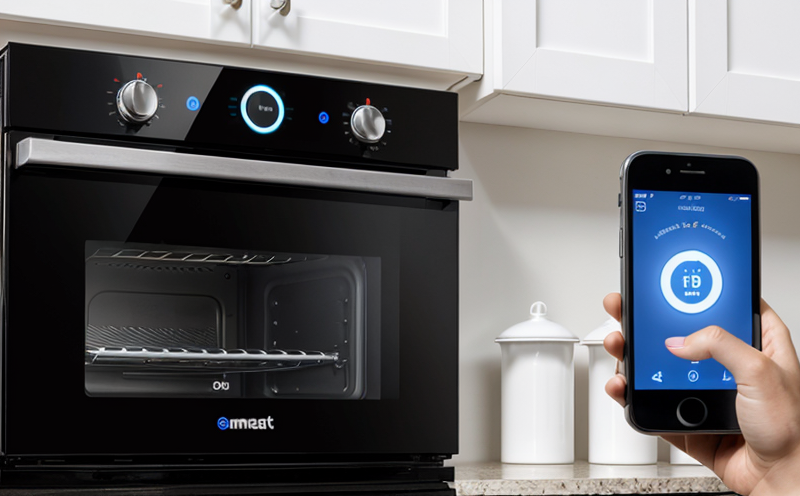IEC 60730 Automatic Electrical Controls Testing in Smart Appliances
The IEC 60730 standard is a cornerstone of quality assurance for automatic electrical controls, ensuring the safety and reliability of electronic devices. This standard applies to numerous sectors including consumer electronics, smart home appliances, and IoT-enabled products. In the context of smart appliances, compliance with IEC 60730 ensures that the automatic electrical controls are robust against various environmental stresses such as temperature variations, humidity levels, and mechanical shocks.
The testing process for IEC 60730 involves a series of rigorous procedures aimed at evaluating the performance and safety of control circuits in electronic devices. This includes both static and dynamic tests to ensure that controls function correctly under all expected operating conditions. Static tests focus on assessing the stability and accuracy of control parameters, while dynamic tests simulate real-world operational scenarios to evaluate how well the system responds to changes in input signals.
For smart appliances, these tests are crucial as they often incorporate complex control systems that manage various functionalities such as temperature regulation, energy efficiency optimization, and user interaction. By adhering to IEC 60730, manufacturers can ensure their products meet stringent international safety standards, which is increasingly important in the global market where consumer trust plays a pivotal role.
The standard also emphasizes the importance of robustness against electromagnetic interference (EMI) and radio frequency interference (RFI), which are common challenges in smart home environments. Ensuring that control circuits can withstand these interferences not only enhances product reliability but also improves user experience by minimizing malfunctions or unexpected behavior.
Furthermore, IEC 60730 testing helps identify potential weaknesses early in the development process, allowing manufacturers to make necessary adjustments before products reach the market. This proactive approach contributes significantly to reducing recall costs and improving brand reputation. Compliance with this standard can also serve as a marketing differentiator, appealing to consumers who prioritize safety and quality.
In summary, IEC 60730 testing is essential for maintaining high standards of product reliability and safety in smart appliances. By adhering to these stringent criteria, manufacturers not only meet regulatory requirements but also build trust with their customers.
Applied Standards
| Standard Number | Description |
|---|---|
| IEC 60730-1 | General requirements for stand-alone and built-in electric household appliances with control circuits intended to be operated by a low-voltage power supply. |
| IEC 60730-2 | Special requirements for stand-alone and built-in electric household appliances with control circuits intended to be operated by a low-voltage power supply, part dealing with specific tests. |
International Acceptance and Recognition
The IEC 60730 standard has been widely recognized internationally for its comprehensive approach to ensuring the safety and reliability of automatic electrical controls in electronic devices. Its acceptance by regulatory bodies across different countries underscores its significance in setting global standards.
Many governments and organizations around the world have adopted IEC 60730 as a benchmark for product testing, reflecting its universal applicability. This recognition translates into greater market access for compliant products, as it signals to consumers that these items meet stringent quality benchmarks. For manufacturers, achieving compliance with this standard can open doors to international markets and enhance their competitive edge.
The widespread acceptance of IEC 60730 is also attributed to its continuous updates and revisions in line with technological advancements. This ensures that the standard remains relevant and effective in addressing current challenges faced by manufacturers and users alike.
Overall, the international recognition of IEC 60730 reflects its role as a pivotal tool in maintaining high standards of quality and safety across various sectors, including smart home appliances.
Environmental and Sustainability Contributions
The testing procedures outlined in IEC 60730 play a crucial role in promoting environmental sustainability by ensuring that electronic devices are designed with efficiency and longevity in mind. By adhering to these standards, manufacturers can significantly reduce energy consumption and waste generation associated with the lifecycle of their products.
One key aspect is the emphasis on minimizing EMI/RFI interference, which helps prevent unnecessary emissions from interfering with other electronic devices. This not only enhances the overall performance but also contributes to a cleaner electromagnetic environment. Additionally, robust controls that can withstand various environmental conditions reduce the need for frequent replacements or repairs, thus extending the product lifecycle and reducing electronic waste.
Moreover, compliance with IEC 60730 helps in promoting the circular economy by encouraging the design of products that are easier to recycle. The standard's focus on durability and reliability ensures that when a product reaches the end of its useful life, it can be more readily disposed of without harmful impacts on the environment.
In conclusion, IEC 60730 testing not only upholds safety standards but also contributes positively to environmental sustainability by fostering efficient design practices and promoting resource conservation.





